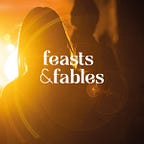A Brighter Kinder Future
The Encouragement Manifesto (Part 3)
When we ran a small business, there were some principles at the heart of it. A code of behaviour. It was owner-run; just the two of us. So the way we worked, who we were, was never written down as such. It was in our hearts. We are pretty sure it was clear to our customers who we were and what was important to us. We worked hard to be consistent, to celebrate others and to stay positive. Our business was built on the successes and strengths of others; kindness and generosity were keystones; we talked about value, not price and that allowed us to find our audience. We gathered up and shared inspiring stories and we sought to be a pebble in the pond, creating ripples. If we’d written this all down at the time, we’d have called it The Encouragement Manifesto. We recently decided to capture it in words. We asked some folk we trust, who live and work in the same way, to interpret the 10 principles in their own words.
Be Kind
by Damon Webb
At architecture school, we endured the ‘crit’ system on a regular basis, a ritual of nerve-wracking presentation of semi-realised concepts, followed by an often clinical dissection by peers, tutors and guest critics, the latter often apparently chosen for their ability to wither with a disdainful look. I last endured this almost thirty years ago, the memory abides.
This system engendered a sense of competitiveness, a win or fail mentality, not an arena for humility, nurturing and growth, or for kindness.
This was the template for interaction that we took into the world of architectural practice, one that played out a thousand times in my career.
It’s taken me a good part of the intervening three decades to de-construct this, to understand where my sense of dread in giving any kind of presentation stems from, and to begin to imagine another, kinder way of interacting and doing business.
On a recent Permaculture course at CAT — itself a welcoming and nurturing environment — we presented design projects to the group.
Members were encouraged to describe one positive that they took from each presentation, whilst the presenter would describe the aspects that they felt had been un-successful or un-resolved. The result was a thoughtful, supportive, enabling and ultimately positive experience, a lesson in humility, encouragement and kindness rather than one in ego and point scoring.
Based upon notions of kindness, respect, humility and thoughtfulness, the principles of Earth Care, People Care and Fair Share, the building blocks of Permaculture, have become particularly relevant in the last few months, and an interesting reference point for future societal and business models.
The planet has heaved a sigh of relief during its three-month holiday, the effects of which may be negligible as the economy re-engages.
Hopefully though we’ve collectively proven that we are capable of the large-scale action for change required to avert climate disaster. Perhaps we’ve also re-evaluated our rapacious desire to consume and to fly in our endless pursuit of ‘experience’. We’ve been forced to consider the local over the exotic, and have perhaps found some exotic in the local.
Wendell Berry has talked at length about the beauty and resilience of local economy; ‘without prosperous local economies, the people have no power and the land has no voice’; the resourcefulness and resilience of local producers and suppliers has been tested and proven in the last few months.
The pandemic has also emphasised the polarities in societies worldwide, the groups of less privileged people that have been disproportionately affected by Covid19 are also the first to feel the most dramatic effects of climate change. The time afforded by the enforced slow-down has also perhaps allowed space for thoughtfulness and humility, for reflection on these inequalities.
Assuming that we don’t experience an immediate return to business as usual, post-lockdown, could there be a lasting desire for change, in the way we do business and in our consumption habits, precipitated by our collective experience? Is there a kinder and more equitable model for business, perhaps less rooted in the inevitable win-or-lose economics that we had come to accept as the norm, more locally based and personal?
For those of us that haven’t been on the front-line, has the slow-down and the luxury of time to think and reflect resulted in a lasting re-focusing?
Perhaps a focus on a kinder approach to our consumption and its effect on the environment; on our interactions with others, using humility and kindness as starting point, rather than hubris and ego; a realisation that kindness to ourselves is not always about materiality — treating and pampering ourselves — but can simply be about carving out time to think, reflect, empathise and re-evaluate; and perhaps this new-found reflectiveness will steer us towards greater tolerance, equity and equality.
The next few months will be a fascinating and crucial test of our willingness and ability to learn and to adapt, to move towards a brighter, kinder future.
Damon Webb is a mid-Wales based architect; co-founder of Chalk Architecture in Brighton, which has delivered projects to reshape and define communities. Recently, he founded Feral Studio Architecture, a celebration of the modest, revelling in the un-ostentatious.
